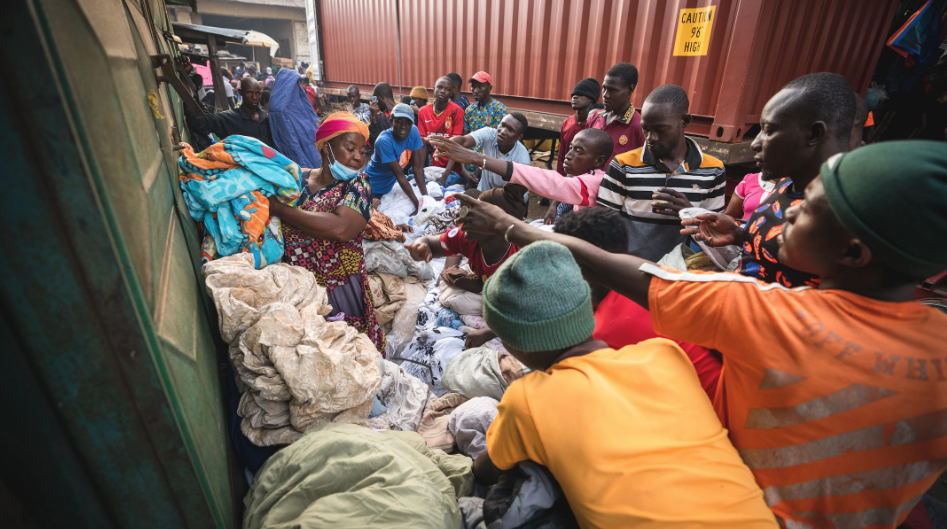“There’s so much excess clothing in Kantamanto, that when it rains, retailers and importers begin throwing clothing into the walkways to soak up the mud.” Via deadwhitemansclothes.org/gallery
Photo courtesy Liz Ricketts. Liz wears a T-shirt recovered from waste stream at Kantamanto. “It’s a T-shirt celebrating the number of arrests made by the Cedarburg Police K-9 — the back has one handcuff for every arrest made by the dog. Recho Omondi’s team embroidered Dead White Man’s Clothes’ on it for me.”
EPISODE 150 FEATURES LIZ RICKETTS
Liz Ricketts is a designer, educator and activist. With Branson Skinner, she co-runs the Or Foundation, a registered charity that operates in both the US and Ghana.
The Or Foundation is on a mission to “identify and manifest alternatives to the dominant model of fashion – alternatives that bring forth ecological prosperity, as opposed to destruction, and that inspire citizens to form a relationship with fashion that extends beyond their role as consumer.”
Since 2016, they’ve been working on a research project called Dead White Man’s Clothes, out of the Kantamanto secondhand clothing market in Accra, Ghana’s capital city.
Maybe you already know about how a large proportion of donated old clothes from the global north (and Australia & New Zealand) gets exported. But how about the detail of what can happens to these clothes after they leave our shores?
Around 15 million pieces of secondhand clothing arrive in Kantamanto each week - and 40% goes to waste.
This is the story of how your old shirt or dress or pants might end up clogging drains in Accra. Or form part of a heavy rope of textiles in the ocean, or lurking under the sand like some dystopian synthetic sea monster. Or smouldering on a waste mountain in an informal dump that’s been on fire months.
It doesn’t have to be this way - maybe your old clothes will get fixed up and sold on to live another life. It’s complicated, as are the solutions.
NOTES
DONATE to the grass roots work of The Or Foundation here: https://theor.org/donate
Read about their various projects here. Here they are on Instagram.
CONSUME, says Liz, “means to use up, to finish something - but we are barely wearing our clothes … we are not using up our clothing at all.”
DEADSTOCK refers to unsold inventory, for example factory or designer surplus fabric or garments. This is pre-consumer waste. Typically brands are overproducing by 20-40%, says Liz. “We don’t just have a linear industry - we have an oversupplied linear industry.”
FEEDSTOCK is a term for the raw resources - you might like to think of them as the ingredients, that go to make the products we consume.
Photo by Andrew Greaves for Foreign Correspondent
KANTAMANTO is Ghana’s biggest secondhand clothing market, “home to over 30,000 individuals working to salvage value out of imported secondhand goods in whatever way they can. In many ways the market functions as a mutual aid network, with retailers supporting one another in times of need. Kantamanto is also the world’s largest consolidated resale platform, recirculating hundreds of millions of items annually. But at the same time Kantamanto is a site of global injustice.” words via THE OR FOUNDATION
DEAD WHITE MAN’S CLOTHES - or obroni wawu - get their name from the common sense explanation for why our cast-offs end up in the market. “This expression comes from the idea that someone would have to die to give up so much stuff, implying that the concept of excess was foreign.” - via Dead White Man’s Clothes - discover the research project & read around the context here.
The ABC Foreign Correspondent documentary Clare mentions that screened recently can be viewed in Australia below. Read the overview here.
KAYAYEI or Kaya Yei is a Ghanaian term for a female porter or bearer. Many of these women have migrated from a rural community to any of Ghana’s cities in search of work. They generally carry their burdens on their heads.
“When we began researching Kantamanto Market, my partner Branson and I set out to become fluent in the invisible. Whose voice is not being heard? What stories are not being told? Who is most vulnerable? So often the answers to these questions involve a group of women, and Ghana’s secondhand clothing economy is no exception. In the case of Kantamanto Market it is the kayayei who labor in the shadows. Kayayei (singular: kayayoo) are female head porters, as young as eight years old, who can be hired in Accra’s markets to carry just about anything, for anyone. In the case of Kantamanto, these young women are hired to transport bales of secondhand clothing from importers to retailers, from retailers to storage, from retailers to consumers, and everywhere in between,” writes Liz Ricketts for Fashion Revolution. Read the article in full here. Image used above by @TheSlumStudio from this article.
“OUR DISPOSABILITY CULTURE IS ONLY POSSIBLY BECAUSE WE’VE TREATED OTHER PEOPLE AS IF THEY ARE DISPOSABLE.”
READ the Instagram post about Old Fadama here.
LANDFILLS ON FIRE
TENTACLES is the name Liz uses for the ropes of textiles
ECOLOGICAL REPARATIONS
“This is not your goldmine - this is our mess.” Read the Liz’s open letter to the fashion industry, published by ATMOS magazine, here.
WASTE AND GREED ARE TWO SIDES OF THE SAME DESTRUCTIVE PATH. THIS MEANS THAT WASTE CANNOT BE REVOLUTIONIZED WITHOUT A GREATER RECKONING AND RECONCILIATION. AND I DON’T SEE MUCH RECKONING. WHAT I SEE IS A MASS DEPOLITICIZATION OF WASTE.” - Liz Ricketts
Thank you for listening to Wardrobe Crisis. Can you help us spread the word? Recommend this episode to others, share it on social media or write us a review in Apple podcasts.





